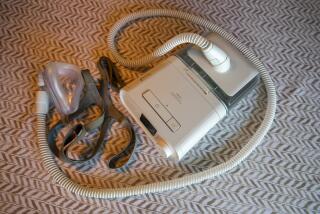FDA reevaluating vaginal mesh implants
- Share via
WASHINGTON – Following a spike in reported complications, the Food and Drug Administration released an updated advisory Wednesday about a surgical mesh implanted in women to strengthen vaginal tissue that can become weakened, especially after childbirth.
In its report, the FDA says a review of industry literature and the adverse event reports has shown little evidence that the device, which is implanted vaginally or abdominally, improves pelvic organ prolapse, where a woman’s uterus, bladder, or rectum can slip out of place. The review found that vaginal implantation exposes patients to a number of serious risks.
The FDA called for a September meeting of a panel of outside experts for recommendations on how to proceed.
“We are reassessing our regulatory options for this product,” said Dr. William Maisel, a chief scientist for the agency’s medical devices arm. Maisel said options include requiring clinical trials to be conducted and changing the classification of vaginal mesh implants to require formal pre-market approval applications. “We feel that the routine use of mesh for transvaginal POP treatment is not necessary.”
Manufacturers estimate that 100,000 women were treated for pelvic organ prolapse with surgical mesh last year, with 75,000 of those implanted vaginally.
The agency first cautioned doctors of the risks associated with the mesh in 2008, citing over a thousand manufacturer reports of complications between 2005-2007. The FDA recommended doctors receive specialized training in mesh placement, and warn patients of complications they identified as serious but “rare.”
Since then, complaints of serious complications associated with prolapse repair have jumped five-fold, and include erosion, when the skin breaks and the device protrudes, and contraction of the mesh that leads to vaginal shrinkage.
Unlike FDA drug approvals, many medical devices are cleared without clinical trial data requirements. Manufacturers who demonstrate their products are “substantially similar” to other products on the market can get clearance to sell the device. Under this system, vaginal mesh devices were cleared for use in treating incontinence in 1996, and for pelvic organ prolapse in 2002.
The agency said it continues to monitor vaginal mesh implants used to treat incontinence, which did not see the same degree of increased complaints, and will release recommendations at a later date.
In a report released in 2009, the Government Accountability Office criticized the FDA for its medical device approval process, saying the failure to reclassify medical devices to trigger more thorough reviews was compromising patient safety.
Even if vaginal mesh products are required to submit formal approval applications, the agency is likely to keep the product on the market as an option for patients. “We don’t think it would be appropriate to remove the products from the market right now,” Maisel said. “However, we do think it’s important that patients and health care providers have the information we have about the adverse events and the lack of evidence for clinical effectiveness so that they’ll be judicious in the use of this product.”






